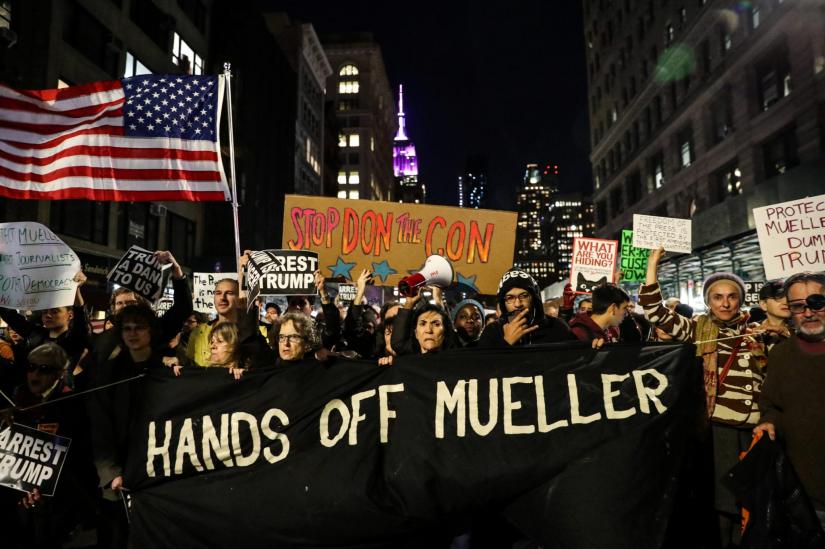 Within hours of the polls closing on Election Day, US Attorney General Jeff Sessions had been ousted from the Trump administration, to be replaced by acting Attorney General Matthew Whitaker. Few doubt that Sessions was essentially fired because of his failure to curtail Special Counsel Robert Mueller’s investigation into whether the Trump campaign colluded with the Kremlin to interfere in the 2016 US presidential election, from which Sessions had recused himself. Whitaker’s previous comments, by contrast, suggest that he might fire the special counsel or simply bury his findings.
Within hours of the polls closing on Election Day, US Attorney General Jeff Sessions had been ousted from the Trump administration, to be replaced by acting Attorney General Matthew Whitaker. Few doubt that Sessions was essentially fired because of his failure to curtail Special Counsel Robert Mueller’s investigation into whether the Trump campaign colluded with the Kremlin to interfere in the 2016 US presidential election, from which Sessions had recused himself. Whitaker’s previous comments, by contrast, suggest that he might fire the special counsel or simply bury his findings.
The prospect of any of this happening has set off a firestorm of concern and anger among Americans who want to know the full truth about Russia’s involvement in the race for the White House and see that justice is served if there was collaboration. Many Democrats have made it clear that they would see any premature halt to the Mueller investigation as a grave constitutional threat. They make a sound argument, but despite the significant Democratic wins in the Nov. 6 midterm elections, there is still little that can be done about this.
The new attorney general will not need to be confirmed by the Democratic House, but by a Senate that will have somewhere between 51 to 53 Republican members. Democrats in the House will have no say in that process; Democrats in the 100-member Senate simply will not have the votes to stop any Trump appointments.
But there is more to it than that. Even if Mueller is allowed to complete his investigation, the likelihood of anything he finds making a dramatic change to the political environment or leading to Trump’s removal from office is slim. Moreover, its effect on his support as the 2020 campaign approaches may also be less than many so ardently hope. The reason for this is not because Mueller will not come up with any major findings, but because he already has. And they have had little impact. Two situations in particular are the kinds of developments that would generally be described as a smoking gun: the evidence of the meeting Donald Trump, Jr. set up between Russian operatives and members of his father’s campaign in 2016, and the convictions and indictments of several Trump operatives, most notably Trump’s former personal lawyer Michael Cohen and campaign chair Paul Manafort. However, these stories dominated the news cycles only briefly before being lost to other political controversies and Trump’s insistence upon “no collusion” with Moscow.
Two situations in particular are the kinds of developments that would generally be described as a smoking gun: the evidence of the meeting Donald Trump, Jr. set up between Russian operatives and members of his father’s campaign in 2016, and the convictions and indictments of several Trump operatives, most notably Trump’s former personal lawyer Michael Cohen and campaign chair Paul Manafort. However, these stories dominated the news cycles only briefly before being lost to other political controversies and Trump’s insistence upon “no collusion” with Moscow.
These events had very little impact not because they weren’t important, but because Trump’s supporters simply didn’t care. Trump has succeeded in making the Mueller investigation so partisan an issue that whatever Mueller has found, or will find in the future, will have little effect other than reinforcing existing views among voters and lawmakers. It is unlikely that anything, even evidence of criminal activity, beyond the campaign finance violations Cohen cited in connection with Trump, will change this.
Trump has never been a very popular president, but his support has been quite stable in the face of revelations that one might expect to influence public opinion. From the time he was inaugurated through the recent midterms, according to Gallup’s weekly polling, his popularity was always between 35 and 47 percent, with fluctuations that were not particularly correlated to Russia-related revelations. By comparison, for a similar period, Obama’s ranged from 44 and 69 percent and Bush’s from 51 and 90 percent. Trump’s numbers suggest that while he is never going to be well-liked by most Americans, there is a floor of about 35 percent that is not going to abandon him.
That base of 35 percent is significant because it roughly translates into more than 35 Republican senators whose voters like Trump and will continue to back him. The presence of those senators and their constituents’ unflappable support for the president is the guarantor that he will not be removed from office by Congress. Regardless of what Mueller finds, even if the Democratic House votes to impeach Trump, there seems to be zero chance that two-thirds of the Senate will cast the decisive vote required by the Constitution.
Mueller’s report will be a valuable legal and historical document because it will fill in the details of an outline that the public has been hearing about since the early days of the Trump administration. But it is unlikely to change the minds of Republican senators, particularly those from heavily Republican states. Nor does the report seem likely to have much of an impact on Trump supporters. They have shrugged off the revelations about Trump and Russia to date – and are unlikely to change their minds based on what, in the best Democratic scenario, will be compelling but complex revelations about the president and the Kremlin.
Lincoln Mitchell is a writer and scholar based in New York and San Francisco. He teaches in Columbia University’s Political Science Department.
 Opinion
Opinion
30873 hour(s) 52 minute(s) ago ;
Morning 04:46 ; Thursday ; Apr 25, 2024
Why Mueller’s Russia findings won’t matter
Send
Lincoln Mitchell
Published : 20:10, Nov 15, 2018 | Updated : 18:57, Feb 06, 2019
Published : 20:10, Nov 15, 2018 | Updated : 18:57, Feb 06, 2019
0 ...0 ...
/zmi/
Topics: Lincoln Mitchell
***The opinions, beliefs and viewpoints expressed in this article are those of the author and do not reflect the opinions and views of Bangla Tribune.
- KOICA donates medical supplies to BSMMU
- 5 more flights to take back British nationals to London
- Covid19: Rajarbagh, Mohammadpur worst affected
- Momen joins UN solidarity song over COVID-19 combat
- Covid-19: OIC to hold special meeting
- WFP begins food distribution in Cox’s Bazar
- WFP begins food distribution in Cox’s Bazar
- 290 return home to Australia
- Third charter flight for US citizens to return home
- Dhaka proposes to postpone D8 Summit
Unauthorized use of news, image, information, etc published by Bangla Tribune is punishable by copyright law. Appropriate legal steps will be taken by the management against any person or body that infringes those laws.
Bangla Tribune is one of the most revered online newspapers in Bangladesh, due to its reputation of neutral coverage and incisive analysis.
F R Tower, 8/C Panthapath, Shukrabad, Dhaka-1207 | Phone: 58151324; 58151326, Fax: 58151329 | Mob: 01730794527, 01730794528


